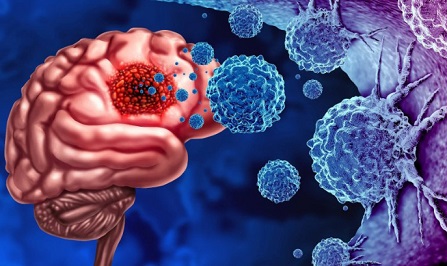BREAKING! Texas MD Anderson Study Finds That COVID-19 Accelerates Brain Tumor Progression And Possibly Causes New Onset Glioblastomas!
Nikhil Prasad Fact checked by:Thailand Medical News Team Apr 16, 2024 1 year, 10 months, 1 week, 4 days, 8 hours, 48 minutes ago
COVID-19 News: The intersection of COVID-19 and cancer has been an area of intense scrutiny since the onset of the pandemic. Recently, a groundbreaking study conducted at The University of Texas MD Anderson Cancer Center in the USA has shed light on a concerning aspect of this intersection. The study reveals compelling evidence of a heightened risk and aggressive progression of glioblastoma following COVID-19 infection. This
COVID-19 News report delves into the background, methodology, results, and implications of this pivotal research.
 COVID-19 Accelerates Brain Tumor Progression And Possibly Causes New Onset Glioblastomas
Thailand Medical
COVID-19 Accelerates Brain Tumor Progression And Possibly Causes New Onset Glioblastomas
Thailand Medical News had previously reported that the risk of developing glioblastoma was increased in hospitalized COVID-19 patients with disease severity.
https://www.thailandmedical.news/news/breaking-covid-19-news-study-finds-that-covid-19-hospitalization-linked-to-elevated-glioblastoma-risk-a-type-of-aggressive-brain-cancer
However newer data shows that even asymptomatic, mild or moderate COVID-19 infected individuals are at risk of new onset glioblastoma and those already with glioblastoma are at risk of accelerated progression of the tumor due to the SARS-CoV-2 virus!
https://www.thailandmedical.news/news/sars-cov-2-and-cancer-increased-neuropilin-1-expression-as-a-result-of-covid-19-can-lead-to-progression-of-primary-brain-tumors-besides-neurological-i
It is also believed that the COVID-19 mRNA jabs can also play a role in the development and progression of glioblastoma!
https://www.thailandmedical.news/news/urgent-validation-needed-on-study-findings-showing-that-covid-19-mrna-jabs-altered-the-biochemical-composition-of-glial-and-glioma-brain-cells
It should also be noted that studies have already validated that viral infections do increase the risk of glioblastomas!
https://bmcmedicine.biomedcentral.com/articles/10.1186/s12916-023-03142-9
Background: Unraveling the Nexus of COVID-19 and Glioblastoma
Glioblastoma, a highly malignant brain tumor, poses significant challenges in terms of treatment and prognosis. Amid the COVID-19 pandemic, researchers have been intrigued by the potential interactions between SARS-CoV-2,
the virus causing COVID-19, and cancer progression, particularly in the context of central nervous system tumors like glioblastoma.
Initial observations hinted at neurological implications of COVID-19, with a notable percentage of patients displaying neurologic symptoms. Moreover, studies exploring the molecular mechanisms of SARS-CoV-2's interaction with neural tissues revealed intriguing pathways that could influence tumor biology. For instance, the virus's ability to induce neurotoxicity through various signaling pathways such as MAPK, NF-κB, and p53 activation raised questions about its potential impact on glioblastoma progression.
Furthermore, the differential expression of coronavirus receptors in glioblastoma tissues compared to normal tissues, along with their association with immune cell infiltration and prognosis, added complexity to this interplay. Insights from COVID-19 research also highlighted enduring dysregulation of inflammation and immune responses, factors intricately linked to tumor microenvironments and immunophenotypes.
Methodology: A Retrospective Case-Control Study
The MD Anderson study employed a retrospective case-control design to investigate the progression of glioblastoma in the context of COVID-19 infection. The researchers identified two cohorts: glioblastoma patients with documented COVID-19 infection (cases) and glioblastoma patients without COVID-19 (controls), matched for age, sex, and other relevant variables.
Key aspects of the methodology included:
-Patient Selection: Inclusion of glioblastoma patients with positive COVID-19 testing and age-sex matched controls with negative COVID-19 testing during their disease course.
-Data Analysis: Comparison of demographic, clinical, and molecular profile data between cases and controls.
-Outcome Measures: Assessment of tumor progression, hyperprogression rates, time to progression, overall survival, and new glioblastoma diagnoses post-COVID-19 infection.
Results: Accelerated Tumor Progression and Clinical Implications
The findings from the MD Anderson study unveiled significant differences in tumor progression dynamics and patient outcomes between cases and controls:
-Tumor Progression Rates: Cases exhibited rapid tumor progression post-COVID-19 infection, with a higher prevalence of multifocality, leptomeningeal disease, and hyperprogression compared to controls.
-Time to Progression: The median time to progression was markedly shorter in cases than controls, highlighting the accelerated disease course following COVID-19.
-Overall Survival: Patients with glioblastoma and COVID-19 experienced reduced overall survival compared to those without COVID-19, underscoring the impact of viral infection on long-term outcomes.
-New Diagnoses: Interestingly, a subset of patients developed new glioblastoma diagnoses shortly after COVID-19 infection, suggesting a potential link between viral exposure and tumor initiation or exacerbation.
Discussion: Unraveling Mechanisms and Future Directions
The study's findings raise intriguing questions about the underlying mechanisms driving accelerated tumor progression in the context of COVID-19. Several hypotheses and avenues for future research emerge from these results:
-Immune Dysregulation: The enduring dysregulation of immune responses post-COVID-19 may create a permissive environment for glioblastoma growth and aggressive behavior. Understanding the specific immune pathways involved could offer insights into targeted interventions.
-Direct Viral Effects: SARS-CoV-2's neurotropism and potential direct effects on neural tissues, including activation of pro-inflammatory pathways and disruption of cellular signaling, may contribute to tumor permissiveness and inflammation.
-Impact of Vaccination: The role of COVID-19 vaccination in tumor biology and progression warrants further investigation, especially considering potential interactions between vaccine-induced immune responses and tumor microenvironments.
Conclusion: Implications for Clinical Practice and Research
The MD Anderson study's findings have significant implications for clinical practice and future research directions in neuro-oncology and COVID-19:
-Clinical Vigilance: Glioblastoma patients with a history of COVID-19 should receive vigilant monitoring for accelerated disease progression and early intervention strategies.
-Immunotherapeutic Strategies: Exploring the interplay between COVID-19-induced immune changes and glioblastoma could inform novel immunotherapeutic approaches tailored to individual patient profiles.
-Long-Term Follow-Up: Longitudinal studies tracking the long-term effects of COVID-19 on glioblastoma outcomes are essential for understanding the evolving landscape of this complex interaction.
In essence, the MD Anderson study represents a crucial step forward in unraveling the intricate relationship between COVID-19 and glioblastoma progression, paving the way for targeted interventions and improved patient care in this challenging clinical scenario.
The study findings were published in the peer reviewed journal: Neuro-Oncology Practice (Oxford Journals).
https://academic.oup.com/nop/advance-article/doi/10.1093/nop/npae029/7642126
For the latest
COVID-19 News, keep on logging to Thailand Medical News.
Read Also:
https://www.thailandmedical.news/news/covid-19-news-scientists-warn-that-existing-mrna-covid-19-prophylactics-create-environment-for-neoplastic-transformation-leading-to-various-cancers
https://www.thailandmedical.news/news/breaking-covid-19-news-doctors-in-thailand-warn-that-covid-19-vaccines-could-possibly-lead-to-tumor-expansion-in-certain-cancers
https://www.thailandmedical.news/news/texas-md-anderson-cancer-center-warns-that-covid-19-mrna-vaccines-elevate-pd-l1-levels-disrupting-lung-cancer-treatments-progressing-other-cancers
https://www.thailandmedical.news/news/south-korean-preprint-study-five-months-ago-warns-that-covid-19-mrna-vaccines-can-cause-a-variety-of-blood-disorders-including-aplastic-anemia
https://www.thailandmedical.news/news/breaking-sars-cov-2-causes-aggressive-breast-cancer-progression-and-manipulates-tissue-stem-cells-in-the-tumor-microenvironment
https://www.thailandmedical.news/news/breaking-news-gene-study-reveals-how-covid-19-mrna-vaccine-leads-to-high-risk-of-iga-nephropathy-eventual-kidney-failure-and-possible-cancers
https://www.thailandmedical.news/news/breaking-hla-g-protein-which-is-typically-upregulated-in-cancers-found-to-be-also-upregulated-in-covid-19-infections
https://www.thailandmedical.news/news/covid-19-can-enhance-the-invasiveness-and-progression-of-oral-squamous-cell-cancer
https://www.thailandmedical.news/news/various-peer-reviewed-published-studies-and-case-reports-show-that-mrna-covid-19-vaccines-can-cause-lymphoma
https://www.thailandmedical.news/news/breaking-news-chinese-researchers-discover-circrnas-encoded-by-sars-cov-2-virus-that-can-cause-cancer-millions-expected-to-get-cancer-eventually
https://www.thailandmedical.news/news/must-read-covid-19-questions-can-the-sars-cov-2-coronavirus-ultimately-also-cause-cancer
https://www.thailandmedical.news/news/covid-19-and-cancer-study-shows-that-sars-cov-2-and-usage-of-anti-covid-19-drugs-can-reactivate-oncogenic-viruses-and-increase-risk-of-cancer
https://www.thailandmedical.news/news/breaking-new-international-study-warns-that-sars-cov-2-infections-will-lead-to-cancers-especially-colorectal-cancers-due-to-disruption-in-autophagy
https://www.thailandmedical.news/news/breaking-sars-cov-2-infection-induces-increase-of-gp73-that-causes-dysglycaemia-increased-gp73-could-also-imply-future-liver-disease-and-liver-cancer
https://www.thailandmedical.news/news/breaking-study-finds-that-cancer-causing-genes-are-upregulated-in-sars-cov-2-infected-individuals
https://www.thailandmedical.news/news/post-covid-19-individuals-advised-to-take-probiotics-as-study-shows-sars-cov-2-induced-gut-microbiome-dysbiosis-increases-risk-for-colorectal-cancer
https://www.thailandmedical.news/news/breaking-study-discovers-sars-cov-2-could-be-carcinogenic-as-it-causes-mutagenesis,-telomere-dysregulation-and-impairs-dna-mismatch-repair
https://www.thailandmedical.news/news/breaking-sars-cov-2-activates-epidermal-growth-factor-receptor-mediated-signaling,-inducing-survivin-expression-which-assists-in-cancer-progression
https://www.thailandmedical.news/news/great-news-study-shows-that-sars-cov-2-protein-nsp13-is-able-to-cause-dna-damage-and-dysregulate-tumor-suppressor-gene-p53,-increasing-cancer-risk
https://www.thailandmedical.news/news/breaking-study-finds-that-upregulated-interleukin-6-drives-development-of-rare-liver-cancers-covid-19-infections-causes-elevated-il-6-levels-in-many
https://www.thailandmedical.news/news/spanish-study-discovers-that-sars-cov-2-infections-leads-to-downregulation-of-p53-a-critical-cancer-protective-gene
https://www.thailandmedical.news/news/breaking-researchers-from-brazil-warn-sars-cov-2-induced-immunological-dysregulation-can-increase-the-risk-of-skin-and-blood-cancer-relapses
https://www.thailandmedical.news/news/breaking-covid-19-news-sars-cov-2-infections-lead-to-cellular-m6a-rna-methylation-loss-in-host-cells-possible-implications-for-cancer-and-other-issues
https://www.thailandmedical.news/news/covid-19-news-will-sars-cov-2-infections-ultimately-lead-to-an-increased-incidence-of-head-and-neck-cancers
https://www.thailandmedical.news/news/breaking-covid-19-news-sars-cov-2-infections-lead-to-increased-risk-of-breast-cancer,-recurrence-of-breast-cancer-and-also-breast-cancer-metastasis
https://www.thailandmedical.news/news/understanding-the-link-between-covid-19-and-cancer-the-role-of-the-slc6a20-gene
https://www.thailandmedical.news/news/2021-peer-reviewed-study-warning-that-covid-19-can-lead-to-pancreatic-adenocarcinoma-seems-to-be-holding-true-as-pancreatic-cancer-cases-rise
https://www.thailandmedical.news/news/breaking-news-french-physicians-uncover-malignant-pseudothyroiditis,-a-new-type-of-thyroid-cancer-in-a-post-covid-individual
https://www.thailandmedical.news/news/breaking-news-researchers-find-that-sars-cov-2-contributes-to-oral-cancer-progression,-treatment-resistance-and-tumor-recurrence
https://www.thailandmedical.news/news/breaking-news-doctors-warn-covid-19-induced-t-cell-exhaustion-linked-to-oncovirus-reactivation-and-development-of-various-cancers
